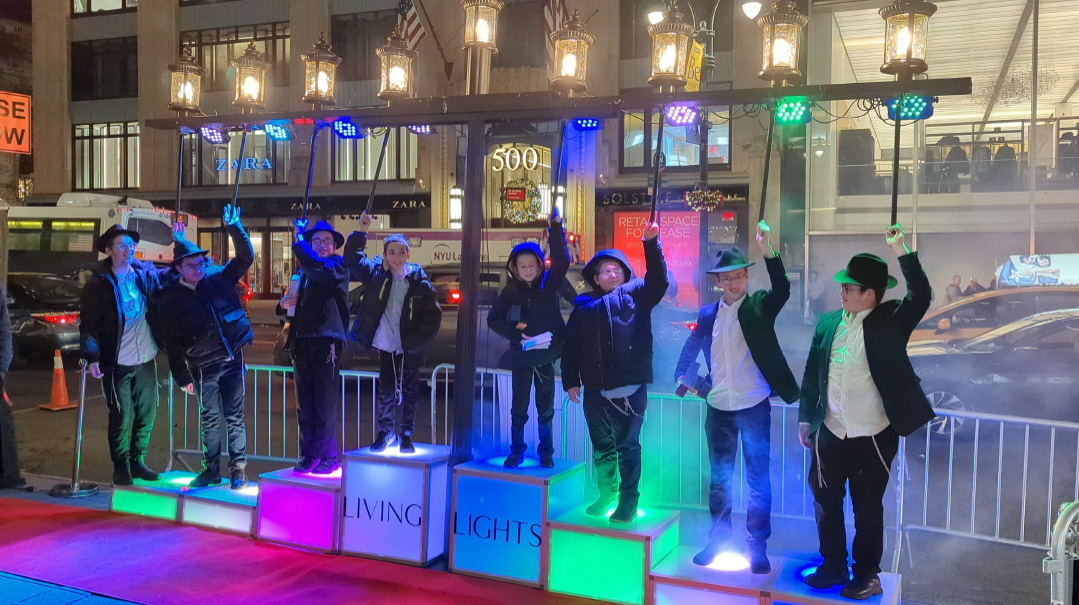Pressure Cooker

Prakti Chasunah Center, a one-stop shop of discounts and deals for chassanim and kallahs from lower-income families in Jerusalem
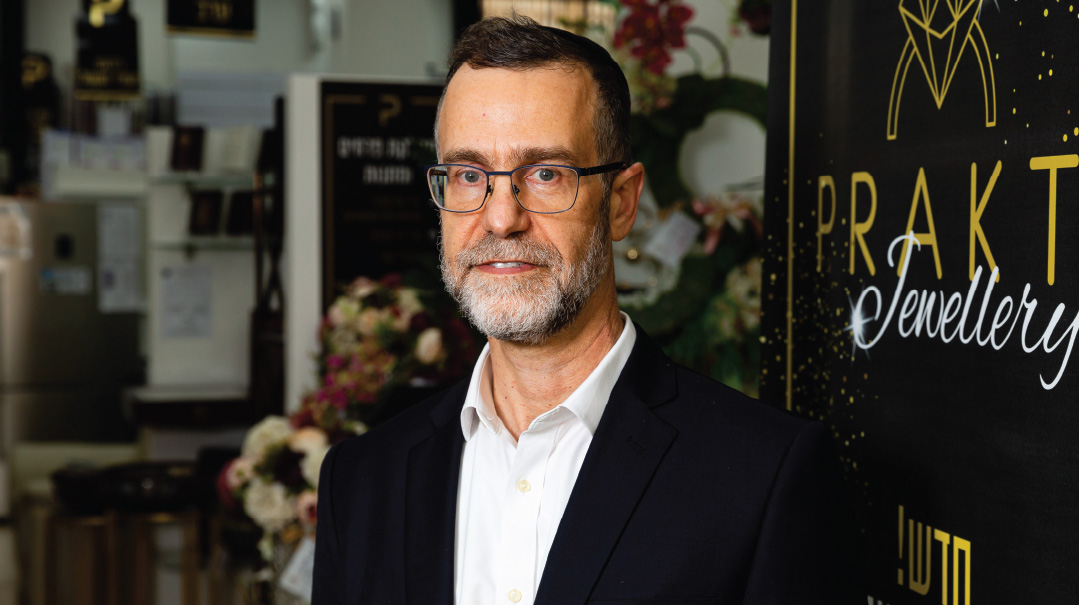
Serial social entrepreneur Shmuel Bisk took things up a notch when he decided to open Prakti Chasunah Center, a one-stop shop of discounts and incredible deals for chassanim and kallahs from lower-income families in Jerusalem. After having created a mortgage brokerage to save families hundreds of shekels a month, one of his 85 philanthropic projects in the last 30 years, his next project will save families significant sums when marrying off their children. He combined his business savvy, his philanthropic tendencies, and his large heart into one giant venture that has the potential to spread positive ripple effects throughout the chareidi community.
He calls it his chesed factory, but the first thing I notice as we’re buzzed into Shmuel Bisk’s Prakti Chasunah Center is the floor. It’s a glossy black with marbleized gold — and it’s gorgeous. In fact, the entire store is beautiful, a cross between a wedding hall and a posh department store, and I’m tempted to sink into a couch and flit through some of the incredible sale areas.
Mr. Bisk welcomes us at the door, a calm and reassuring presence that blends perfectly with the Prakti ambience. Of course, we’re there before hours; Mr. Bisk assures us it gets pretty crowded once the doors open to the public. Mr. Bisk introduces us to Rabbi Moshe Weissfish, his CEO, and we start a tour that leaves me with a serious shopping bug as well as the most sincere “mi k’amcha Yisrael” I’ve said in a long time.
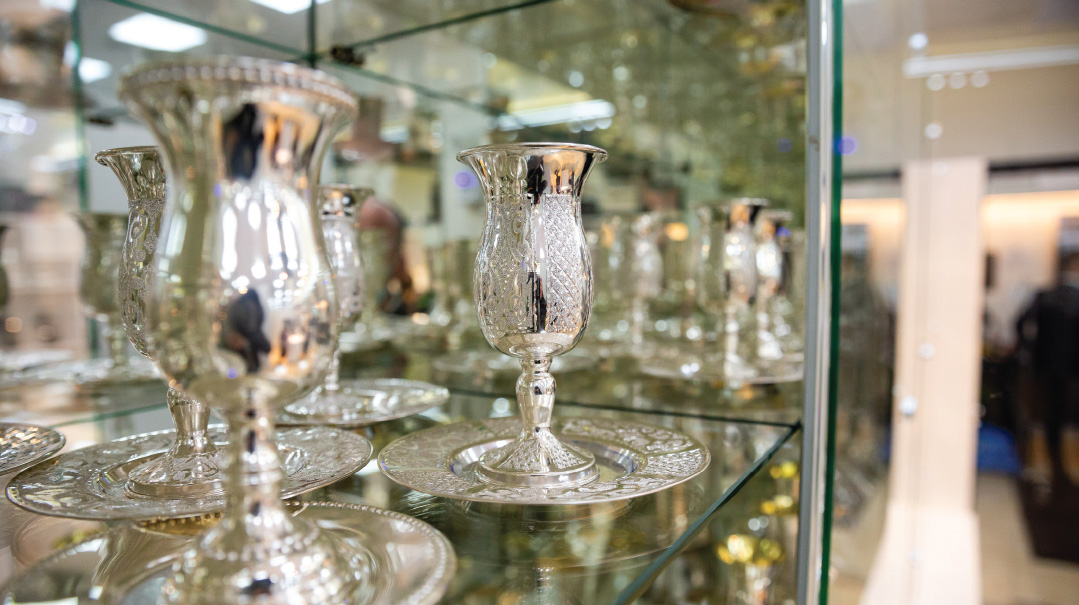
All That Glitters
Our first stop is a small glassed-in room that the CEO unlocks carefully. We file in, oohing and ahhing over the rows and rows of candlesticks, the becher collection, and several intricate menorahs.
“All styles: modern, classic, unusual. I pick out the latest trends,” Rabbi Weissfish says. “All for 700 or 800 shekel less than market price.” I admire the glass display case housing the chassan watches, their brand names catching my eye. The jewelry shelves are empty though, save for a few necklaces on display.
“For insurance purposes, we can’t open the safe until the jeweler arrives every day,” Mr. Bisk explains. The jeweler is Rabbi Yitzchak Weiser, who came out of retirement to lend his professional expertise to Prakti. Before that, Rabbi Weiser worked in a jewelry store in Geula for 40 years before retiring three years ago.
Prakti has everything from vort bracelets to diamond rings, necklaces, earrings, fashion rings, as well as the diamonds themselves. It’s the only location that sells wedding jewelry for 25 percent cheaper than the market.
We admire the glittering shelves a while longer and then exit, pausing while Rabbi Weissfish locks the door behind us.
Several twirling chandeliers light our way as we enter a small room with a desk and shelves. Not a shopping room, though. “This is our service room,” Mr. Bisk explains. I read the gold lettering painted on the wall. “Gowns… makeup… hair salons.”
Rabbi Weissfish pulls out a glossy voucher and explains. A kallah can choose one of the locations listed with Prakti to rent a gown from or make appointments for her wedding hair and makeup, using a Prakti voucher to save 800 to 1,000 shekels on the gown, off the asking price.
“What about sheitels?”
“That we have there,” Mr. Bisk says, pointing upstairs.
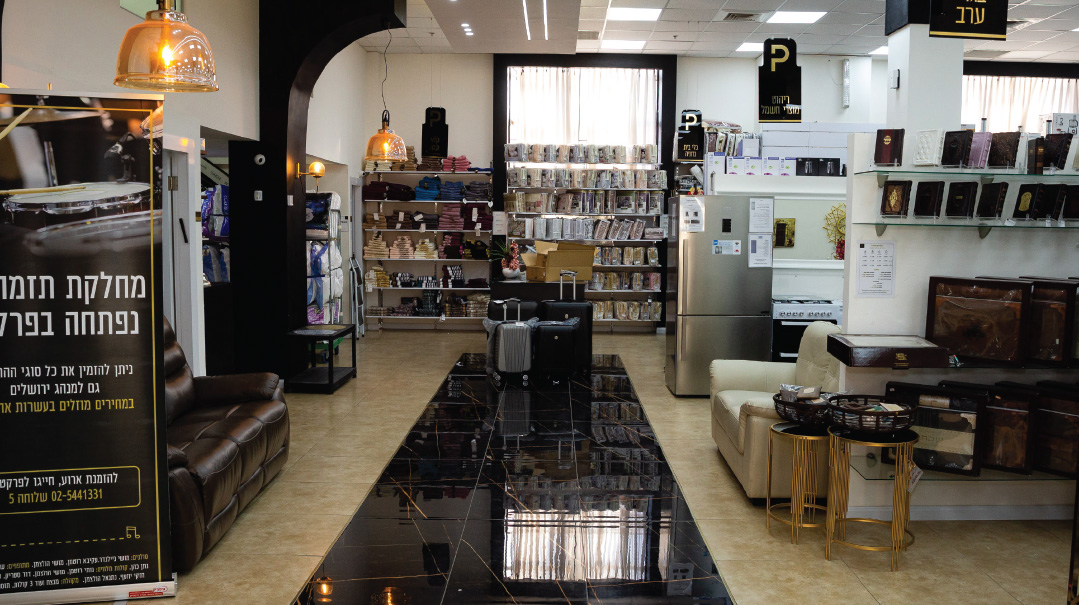
Take Off the Stress
“Prakti was founded on the three ‘Mems,’ ” Rabbi Weissfish says. “Mem one is makom echad, one place. This one store is 500 square meters of everything, and really everything, a chassan and kallah and their families will need to make the wedding.”
Mr. Bisk elaborates. “A family in need of financial assistance will go the extra mile to compare prices, to find a good deal, from store to store to a faraway sale, anxious to find what they like but not overpay. Very often these women are working full-time and have housefuls of children, they don’t have the time or energy to run around, but they don’t have the luxury to overpay. Here we have it all in one location at the best prices.”
He leads the way out and points to a beautifully set-up drink bar against more black and gold marble: a chic coffee corner that lends a cozy air to the elegant surroundings. “We want our customers to enjoy a hot drink, relax, feel special.
“Also, when everything is located in one area, you can go back and take something less expensive here so you can get something pricier there, the cheshbon is laid out clearly for you. Less regret and more freedom to choose,” Mr. Bisk adds.
We stand in front of luggage sets, and Rabbi Weissfish shows us a durable model for a price several hundred shekel less than in stores. “We want the chassan and kallah to feel like royalty, to understand that it’s exciting, shopping for their starter home, planning a wedding. They shouldn’t just be subject to the financial stress and pressure their families are under. And there’s real pressure.”
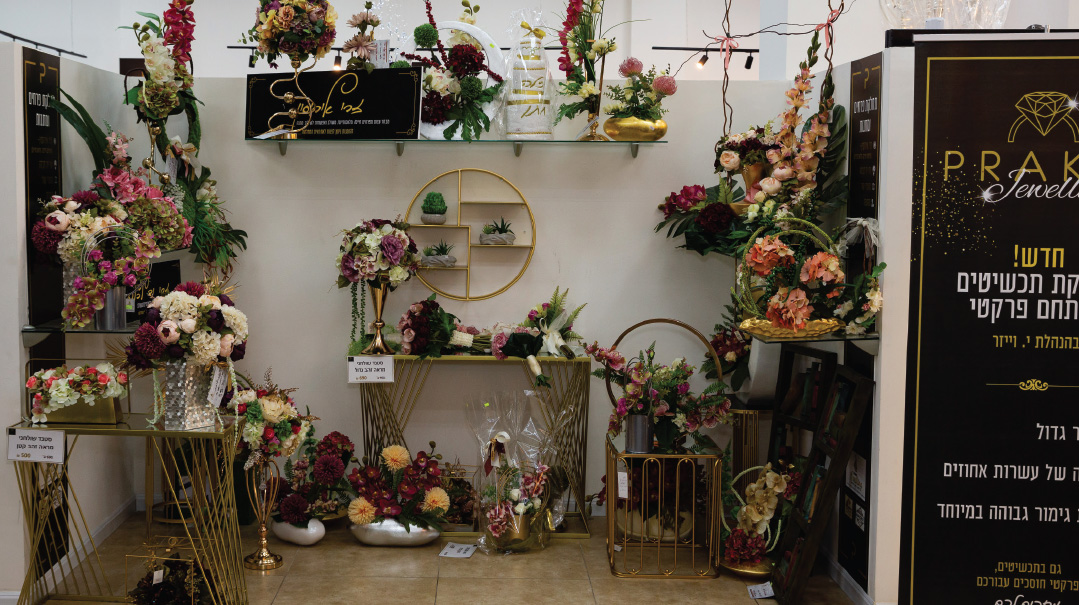
It Should Be a Time of Joy
Several years back, Shmuel Bisk started Pitronot (Solutions), an organization designed to help those struggling with backbreaking debts. Soon after they started, they recognized a related problem: “My business partner and I decided we had to do something about the fact that business was far too busy, too many chareidim were finding themselves under mountains of debt. And debt is the sort of problem that leads to other heartbreaking issues: shalom bayis destroyed, children kicked out of schools, families broken.”
The collateral damage, Mr. Bisk explains, was too big, too far-reaching. Very often, the straw that would break the client’s back was making wedding after wedding, events that should be joyous but were in reality, far from it.
“It wasn’t their first wedding that would do it, or the second. It was the fourth and fifth, huge zechusim that would cause their lives to crumble.”
Mr. Bisk and his partner Meir Shternberg decided to create a self-sustaining initiative that would decrease these families’ wedding expenses by 25 percent without taking tzedakah money to fund it — they wanted a self-sustaining model.
“Prakti is just that,” says Mr. Bisk. “It’s run like a business, but my mission statement has nothing to do with profit. We earn a tiny profit margin in order to return start-up expense loans, and to be able to expand and have some stability.”
I think about the average chareidi family I know, seven to nine children, close in age. Many of them are still busy with upsherens and Chumash parties, but it won’t be long before it’s bar mitzvahs, and then weddings.
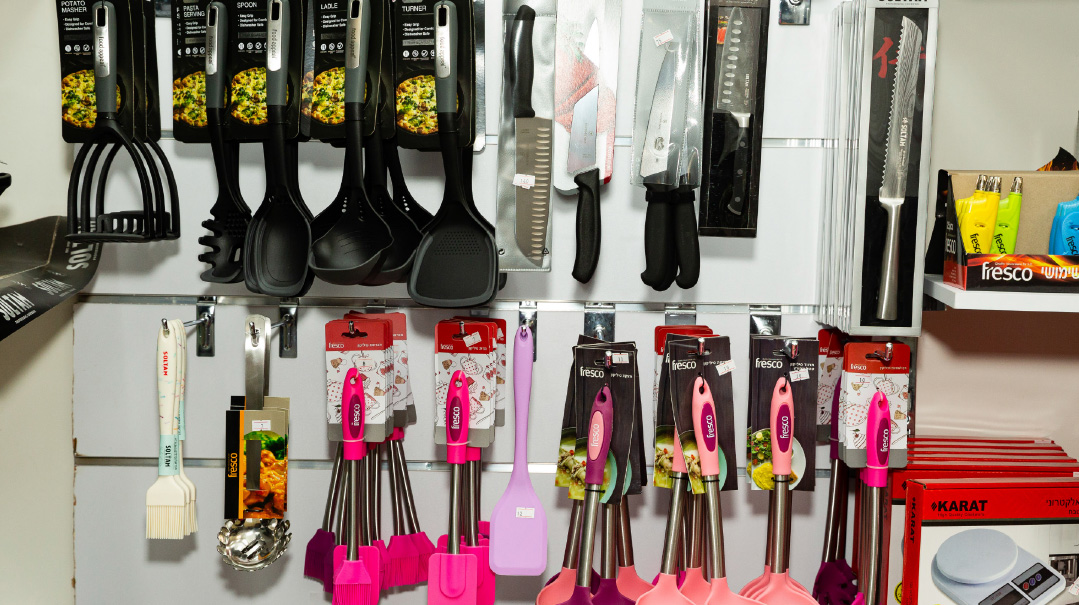
From Soup to Socks
Rabbi Weissfish leads us to the housewares, pointing out the Food Appeal and Soltam pots, the electric kettles, the sharp knife sets, Shabbos cutlery and regular cutlery, trivets and cutting boards and measuring cups, Shabbos thermoses and garbage cans.
“The second mem is mechir, price. The best prices on everything. This Soltam frying pan is 100 shekel elsewhere, 49 shekel here.”
We wander to an Ikea-looking display with different table settings on a striking black cabinet. A modern brown swirled soup bowl, crisp white plates, colored chargers, silver and gold coffee and tea jars.
Behind us are blankets and down quilts from the popular Israeli brand Fried, as well as their lesser-known brand, Avenue, all for hundreds of shekels less than stores. I admire linen patterns, towels of every color, pillows and cushions.
“This is one of our fastest-moving sections,” Rabbi Weissfish says, pointing at the shelves.
We double back to the front, stopping at a gorgeous display of fake flowers in varied colors, bouquets, and arrangements.
“These are fake for those who prefer that, and so the display will last. But for the kallah who dreams of real flowers for her bouquet and the chassan’s parents who want to buy an elaborate arrangement for the vort…”
Rabbi Weissfish pulls out a tablet and finds the flower page, and I begin to scroll. White flowers, forest tones, huge arrangements….
He takes the tablet back. “All for 30 percent off.”
Mr. Bisk motions us toward the men’s clothing area. “You know, I was worried when we first started that I was doing a chesed for some on the cheshbon of others. If our prices are far more appealing, am I stepping on the toes of hardworking store owners? Before we started, I asked Rav Chaim Malinowitz ztz”l and Rav Asher Weiss. Both told me as long as my market is niche to chassan and kallahs, it’s 100 percent fine, as well as a huge mitzvah.”
“Well, how can you be sure it’s just for chassanim and kallahs?” I ask. “How can you be sure that the people coming to the store are actually making weddings?”
Rabbi Weissfish shrugs. “We can’t really. But we have a screening process. You can enter the store only if you have a Prakti card” — he pulls out a shiny black credit card — “and we only give cards based on references from the kallah’s seminary, let’s say, or a chassan’s yeshivah. We’re thinking now of having a member of a neighborhood Neshei vouch for the families, as well.”
The rules are strict: Prakti Chasunah Center is for those making a chasunah or those getting married, and the chassan and kallah can buy their furniture at Prakti until two years after the wedding.
“But would it bother you,” I ask, “if someone snuck in?”
Mr. Bisk looks unconcerned. “Not really. I’d prefer it just be for a chassan and kallah, that’s the crowd we target, but if someone needs the discounts badly enough to be dishonest, then they must really need it.”
We move on to the menswear: leather shoes, glittering cuff links, colognes, belts, ties.
“Our suits are brand new,” Mr. Bisk says, pride evident in his voice. “Brand names manufactured them, but with our labels, so I can sell them for half the price.” I smile as I walk past the kittels hanging proudly, just waiting for an excited chassan to try them on, and continue on to socks, undergarments, shoe polish. I stop at the tzitzis and tallis section. Rabbi Weissfish pulls out a large binder to show me the 30 or so different Malchut tallis-bag choices, with an option to add the chassan’s name.
“Then there are the leather options.” I admire the more modern selections, smooth browns and cool tans, hanging in plastic bags, and notice a bin of umbrellas. They’ve thought of literally everything.
“We don’t sell hats on-site just yet,” Mr. Bisk says almost apologetically, “although we do offer discount vouchers to buy them elsewhere.”
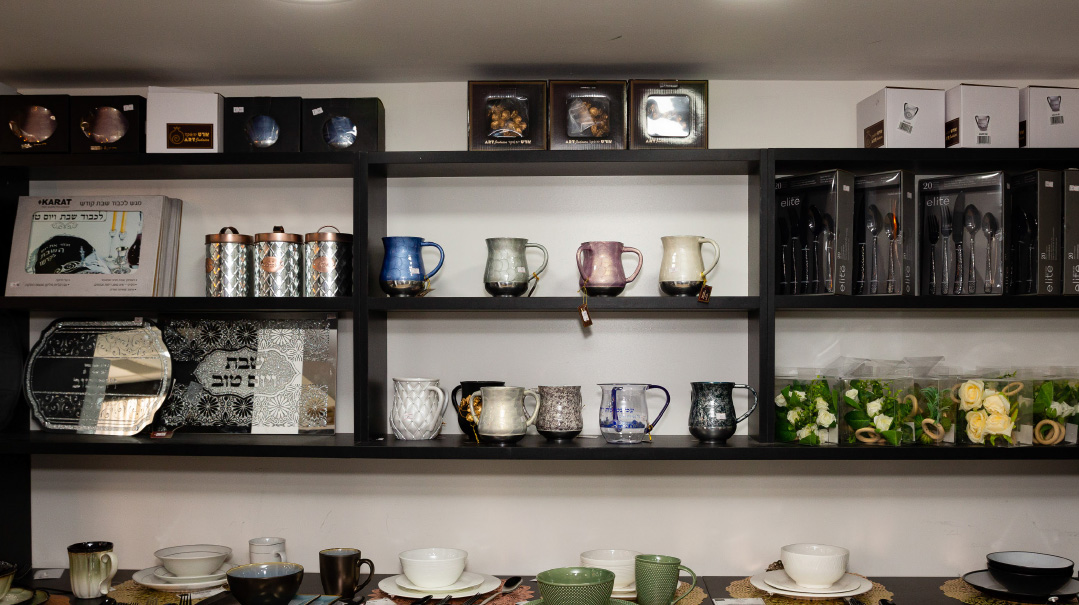
Finally, Freedom to Choose the Best
Mr. Bisk leads us to an official-looking office.
“The third mem is mimun, financing,” he says. “Customers can sit with the Prakti advisor, who helps set up a low-interest payment plan with a bank. The bank loans we arrange are better than what you would get on your own, on par with a very good mashkanta — right now it’s 3.6 to 3.7 percent for loans up to 75,000, for each side, payable up to 36 months.”
Prakti is also often able to obtain a loan for those who don’t qualify to do so on their own. The payback process is also more seamless through Prakti.
“If you spend large amounts here, you can spread the payments over more than 60 payments. It’ll be the same amount coming out of your account every month, from one source. If you shopped in six different stores, and have six different payments coming out at different times, it can be hard to keep track of your bottom line.”
We stop to admire the gifts, the Havdalah sets, challah knives, siddurim and machzorim, gifts for the chassan and kallah and also for your future in-laws or mechutanim. Rabbi Weissfish pulls out another binder, this one showcasing the myriad colors, styles, fonts, and nusachim of a kallah’s siddur.
I look at the pinks and browns, admire a beautiful gold choice.
I think of a kallah, sandwiched between sisters, some brothers, a mother who teaches, a father in kollel, always hearing “You can pick from this shelf, this is within our budget,” and “The brown was on sale, so we got brown,” and I realize this girl has probably never had the freedom of choosing something like this.
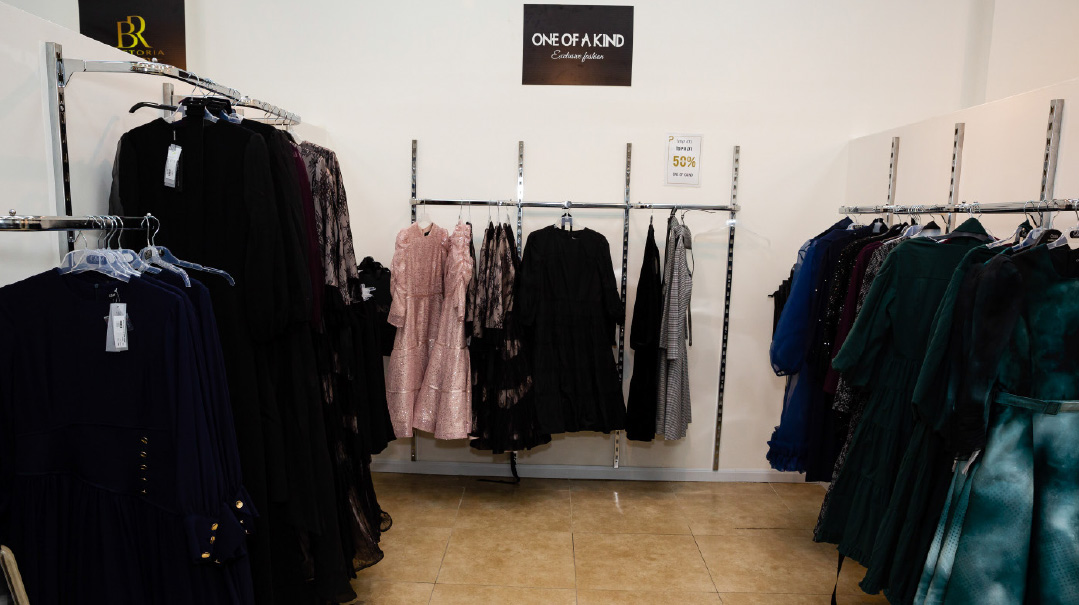
Every Girl a Princess
We enter the women’s clothing section; I recognize the brands like One of a Kind, Brittoria, and Rachel Sitbon. A rack of coats, hosiery, everyday clothing to gowns. “For the family, it’s all 20 percent off. For the kallah, it’s 25 percent off,” Rabbi Weissfish explains. A lace gown catches my eye — it’s boutique luxury for a bargain-basement price.
We head up the stairs to the women’s section. The sheitel salon is bright and airy, with accessories hanging from little racks. Large mirrors and pine flooring make it feel both homey and exciting.
I lean over to read the tag hanging on a glossy brunette wig: “Miri Kopelowitz.”
I look around some more. These are real brand names. For 20 percent off.
“The kallah gets the full service — she goes to Miri Kopelowitz, who does it all for them there. They just purchase here, saving on the price,” Mr. Bisk explains.
We turn the corner into a makeup and perfume section. Behind that is the robes and loungewear. Everything a kallah would need, right here, on the second floor of the industrial zone at Shatner 3.
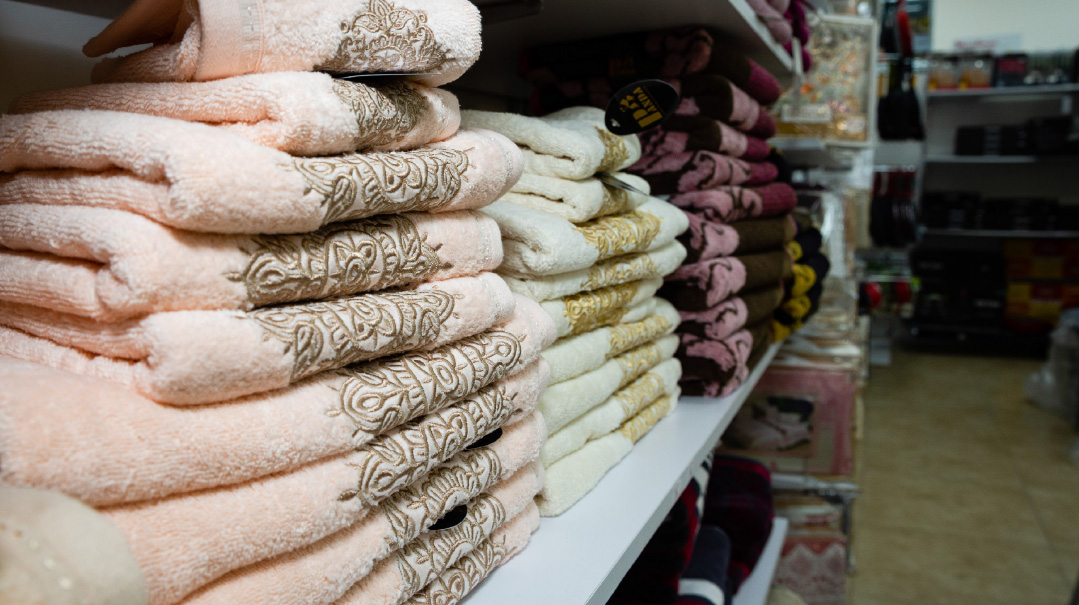
Feeling Dignified
We head down another staircase into an adjoining storage room.
“This is where we store the goods not on display.” I look around at the stacks of towels, towers of pots, huge mounds of blankets. “This all gets bought out by the end of the month.”
That’s a lot of Jewish weddings.
“There were philanthropic investors, people who said they’d donate the initial funds, but then coronavirus came, and they all kind of fizzled away. Which is fine, there were no contracts or anything,” Mr. Bisk admits. “I did get one philanthropic donation, but the rest is personal money. One philanthropist loaned me fifty thousand dollars and I signed with the bank for fifty thousand as well. These are personal loans, not through Prakti.”
Mr. Bisk gives a “what-can-you-do?” shrug. “Right now we don’t make a profit, we haven’t even broken even, but one day, soon, I hope we’ll make enough to be able to broaden the scope of Prakti, maybe subsidize items for those in need, gift the items to yesomim, who knows.”
In fact, Prakti is already making strides in that area.
“We began enabling direct donations to subsidize the chasunahs of yesomim and yesomos and for poorer and struggling families. This way the donor knows that when he gives to make a chasunah, it goes for the wedding and not the electric bill or outstanding tuition. And it’s in a kavodig way — money is just added to the family’s account, no one else has to know.
“It’s important a chassan and kallah feel mechubadig,” Mr. Bisk says emphatically. “My wife is a kallah teacher. She says the same way everything needs to be nice for a kallah, everything should be nice throughout the simchah.”
I lean back and look around. Rabbi Weissfish is deep in conversation with one of the boys who has been schlepping goods and popping up throughout the tour.
“We have 20 service people, plus schleppers and back office staff. The families love that, the level of service, the attention,” Mr. Bisk continues.
Rabbi Weissfish looks up. “This is the man I ask brachos from,” he says, nodding toward Mr. Bisk.
Mr. Bisk ignores this, but I understand what his CEO is saying. It takes a truly altruistic person to pour their heart and soul into something solely for the benefit of the klal.
“Rabbi Weissfish is wonderful, he makes the nitty-gritty decisions, he’s on the floor with customers, shining, polishing, choosing colors. I’m behind the scenes, sharing in the larger-scale decisions. I dedicate around five hours a week to the store. It’s my chesed factory, churning out chesed daily without the constraints and constant hassle of relying on fundraising.”
We step out of the machsan, blinking in the dying sunlight. We enter the store from the front, and just like that, it’s full of people.
I look at my watch: 4:57. In three minutes, Prakti will open its doors until 10:00 p.m., to accommodate working customers.
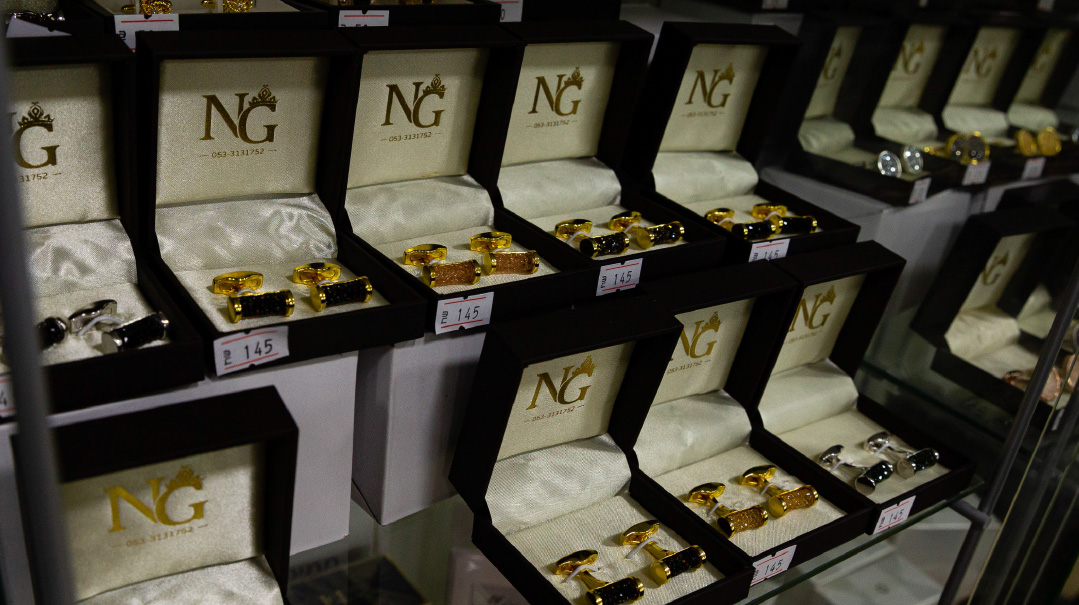
One Step Closer
Suddenly, the quiet store is teeming. I watch a young man load a basket with socks, two giggling girls finger frying pans. The bell rings, and an adorable chassan and kallah enter, laughing breathlessly. They head right into the silver/ jewelry room and I’m genuinely happy for them.
I want to talk to them, hear their stories, but they’re busy and I don’t want to bother anyone. I look around and see several women with name tags.
“Do you work here?” They nod, smiling. They seem friendly and warm, and one of them, Tzippi, motions me to follow her.
“Rabbi Weiser can’t come today, so I need to open the safe and take out the jewelry,” she says.
We do set off the alarm, but eventually, case upon case of glittering jewelry is set on display. I even watch Rabbi Weissfish pull out tiny envelopes hosting glittering diamonds.
“My expertise is silver,” Tzippi says. “I used to work in Elite Silver in Boro Park, and let me tell you, this silver is of the highest quality and for prices that can’t be believed.”
I ask her to share a story with me and she laughs. “I’m the story person, I always have the best ones. Okay, listen to this. A woman was making two weddings in one year, so she visited the store several times. When she bought her daughter-in-law’s candlesticks, she saw a pair of candlesticks that she loved. This woman was married 30 years and never bought candlesticks because she had received a pair as a yerushah. Now, the pair she wanted also happened to be our most expensive pair.
“On Chanukah, she came with her husband to make a payment plan and she stopped to ‘visit’ her candlesticks. Her husband saw how much she loved them and said, ‘Buy them.’ She said, ‘No, of course not, we have no money,’ but he insisted and I told her, ‘Just say yes!’ So she said yes, she was so thrilled. And I told her husband, ‘It’s for Shabbos, it’s on Hashem’s cheshbon.’ That was Thursday.
“Sunday, she comes to the store to tell me that right before Shabbos, her husband had met an old acquaintance and mentioned to him casually in passing that he was making two weddings. The man, on the spot, said he was gifting her husband ten thousand dollars. And just like that, Hashem footed the bill.”
On my way out I pass by another worker. She smiles at me and introduces herself as Batsheva.
“There’s nothing like working here,” she says. “Rabbi Bisk and Rabbi Weissfish put their entire hearts into this place. And Mr. Bisk, he is zocheh u’mezakeh the world. This store” — she gestures around her at the marble floors and excited crowds — “this store is going to bring Mashiach.”
(Originally featured in Mishpacha, Issue 858)
Oops! We could not locate your form.








